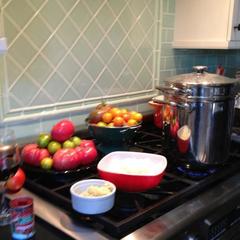14 hours ago, Thanks for the Crepes said:I use eggs, cheeses, including cottage cheese, which I like, yogurt, beans, and some nuts to make up for the lack of nutrients I miss by my unwillingness to deal with cooking meat. I also like seafood, which often doesn't suffer the degradation that meat does by boiling or gently sauteeing it.
Does anyone have any suggestions to get protein and B12 without dealing with meat every day? I appreciate any input.
It sounds to me as though you're doing what you need to do already. This article about Vitamin B-12 sources and needs indicates that cheese, yogurt, milk and eggs all are sources. They also mention fortified cereals, nutritional yeast and fortified plant-based milk. (I assume that means soy milk, but I could be wrong.) I've never tried nutritional yeast, but the article makes it sound as though it would provide the umami kick that meat does, as well as providing the extra missing nutrients. According to this article, you only need about 2.4 micrograms of B-12 per day. Here's an excerpt from the article about quantities:
QuoteA vegetarian should be sure to consume enough of the following foods on a regular basis. It is vital to understand how much vitamin B-12 these foods contain:
- 8 ounces (oz) of yogurt contains about 1.1 mcg of vitamin B-12
- 1 cup of low-fat milk can provide 1.2 mcg of vitamin B-12
- 1 oz of Swiss cheese can contain 0.95 mcg of vitamin B-12
- 1 large egg contains 0.6 mcg of vitamin B-12
Fortified cereals are a good choice as they have high bioavailability. This means that the vitamin B-12 does not have to break down before the body absorbs it.
I'll also point out that @sartoric provides a regular treat of Indian food, and searching out her posts can show delicious ways to get yourself a balanced meal without meat. She isn't the only vegetarian here, of course, but she's been inspiring me lately. @shain also produces regularly delicious-looking meals.
Incidentally, the same discussion above applies to protein. You already mentioned beans and nuts, so I don't think I need belabor the point.
A final point: you might wish to check out this topic for more ideas: Vegetarian Recipes and Meals.





